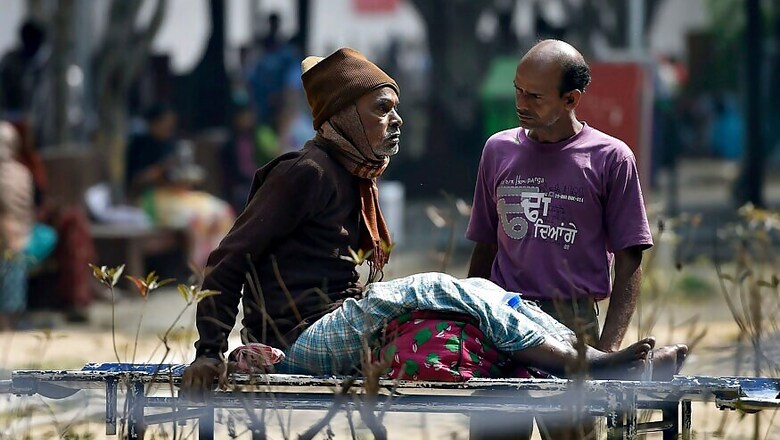
views
New Delhi: A bottom-up medical approach which privileges medical treatment instead of offering psychological support in cases of mental illness needs to be addressed, said Stanford Professor Dr David Spiegel.
Spiegel is the Willson professor and associate chair of psychiatry and behavioural sciences, Stanford University School of Medicine.
He was speaking to News18 in an exclusive interaction on the sidelines of the 16th Hindustan Times Leadership Summit on Saturday.
The bottom-up approach and its risk
The author of 404 scientific journal articles and 13 books, Spiegel and his colleagues had taken the world by storm in 1989 when they reported, in a study published in Lancet, that women with breast cancer who participated in group therapy sessions lived an average of 18 months longer than patients who didn’t receive psychosocial support to cope with their diagnosis.
“The study was very popular and there were two reactions. The predominant one was, this was very exciting. There were some who were critical of it...there are some people who are not yet convinced that social support can help in survival,” he said.
This, he argued, continues to be linked to a “bottom-up bias in medicine”. “We think that the real truths are molecular and biological. The way, the system as a whole is run, doesn’t affect survival,” he said.
“But the brain is a huge regulatory system that affects everything from our heart beat to our blood pressure to stress hormones. There is no reason that how we use that brain will not affect our body's ability to survive,” he said, adding that as human beings our survival was linked to how we form human relationships. While noting that often diseases of the mind would deemed as being of “lesser order of importance” as opposed to ‘real diseases’ like cancer, heart disease or diabetes.
He said, “There is a kind of disrespect towards what we do as entire organisms to keep ourselves alive.”
He gave the example of dealing with chronic pain, wherein a majority of American are put on opioids in spite of there being alternative psychological treatments like self-hypnosis. “Because of that bottom-up bias, we think it is much better to use a physical treatment although it is much more dangerous than using a psychological or psychosocial treatment,” he said, adding that industries like the pharmaceutical industries had “reaped benefits from this particular model”.
“It is one model, but it is increasingly not working and in a world that is growing, what we are doing is we are turning a lot of previously terminal illnesses into chronic illnesses,” he added.
The Indian context
“The idea of criminalising desperation is awful,” he said while noting that the Mental Health Act and the decriminalising of suicide were much needed steps in the right direction.
India is facing a serious mental health crisis, with the World Health Organization estimating that 56 million people suffer from depression and 38 million from anxiety disorders.
“I think the change that has happened with the mental health act is great...These people need help, they don't need punishment...but the fact that the government has taken a position that it is a responsibility to provide that is a very important change,” he said, while admitting that there would be difficulties.
“The idea that the mentally ill are to be viewed as deserving compassion and support and not desertion and to be punished ...India now is on the verge of really doing that,” he said.
Spiegel added that the view that ‘mental health issues’ were limited to economically privileged classes was untrue. He said, “There is no reason to think that any segment of society doesn't have mental health problems. People in rural areas, particularly poor rural areas, have less in the way of resources...There is no group of humanity that is exempt from mental illness.”
A 2011 study by the Department of Community Medicine at Maulana Azad Medical College that sought to assess the perceptions about mental disorders and health seeking behavior in the country found that mental health issues ranged from loss of semen or vaginal secretion to divine punishment for past sins.
Asked about the difficulties of attempting to communicate mental health issues to medical practitioners, Spiegel explained, “You can do it in plain language. If you're hopeless, if you feel worthless, if you're thinking of death...the answers to those questions will take you a long way. Because depression isn't just sadness, it is feeling terrible about yourself,” he said.
Something hypnotic about a screen
With concern regarding the impact of social media and screens mounting globally, Spiegel said, “I think it is possible. We still have a lot to learn about what these devices are doing to us and what we are doing to them. I do think that the constant flow of information can disconnect you, not just in terms of your mind and body but also to each other,” he said.
Adding that sometimes he thought that the screens “are using us more than using them”, he pointed out that they were something “hypnotic” about narrowing the source of information to a single screen.
“I think sometimes they are using us more than we are using them. There is something engaging about it. One thing is that they are telling you what to look at, so you don't have to make those executive decisions,” he said.
“There is something hypnotic about narrowing your source of information......you're narrowing your focus...so there is something hypnotic like about a screen that is providing you with information,” he added.




















Comments
0 comment